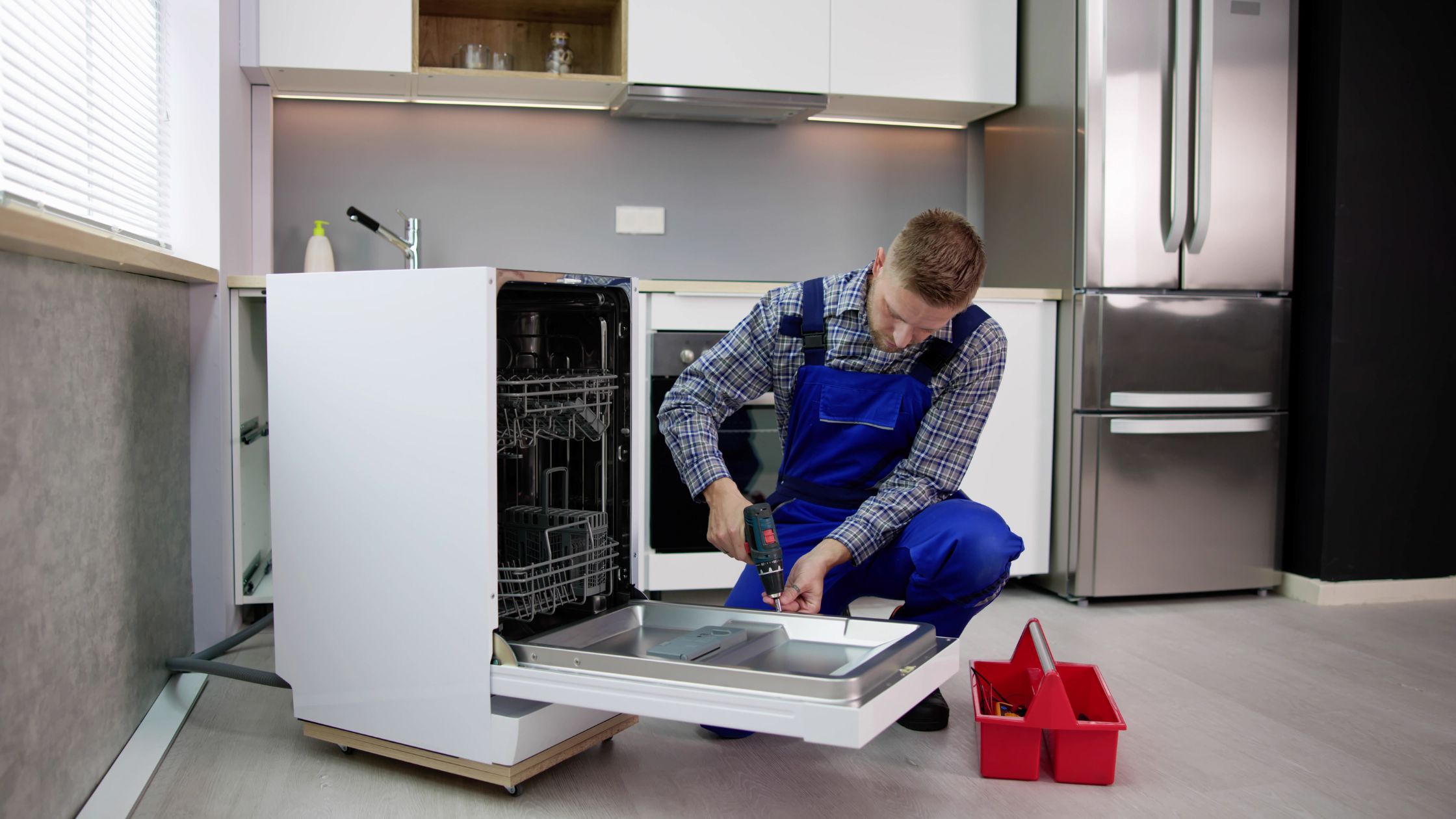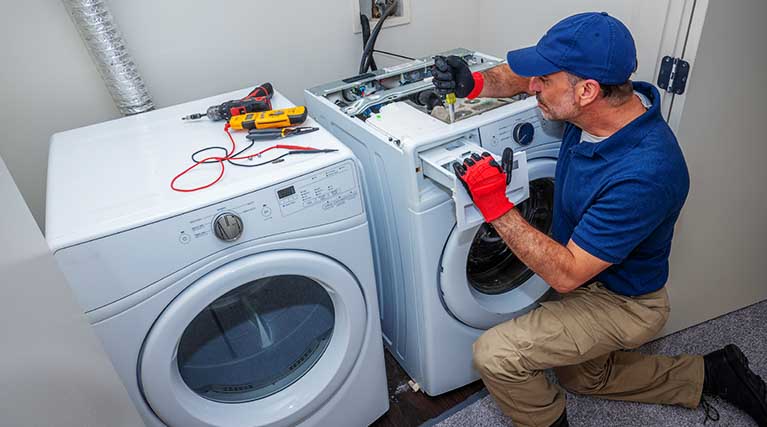The Ultimate Overview to Recognizing Device Repair Work in the house
When your refrigerator stops cooling or your stove declines to warm, it can really feel overwhelming. Understanding appliance repair work in your home can save you time and money. You'll learn to recognize signs and symptoms, use important devices, and follow a systematic troubleshooting process. But prior to you begin, there are essential safety precautions you need to take right into account. What are the most common problems, and exactly how can you fix them? Allow's discover the essentials.
Common Home Appliance Problems and Their Symptoms
When your appliances start acting up, it's necessary to acknowledge the signs early on. Ignoring them can bring about bigger problems and costly fixings. If your fridge isn't cooling down effectively, you could observe warm spots or condensation creating. This might indicate a failing compressor or a blocked vent.Your dish washer may reveal problems with unclean meals or unusual noises during cycles. If you listen to grinding or clanking, it's time to investigate.A cleaning equipment that will not rotate or drain can leave you with soggy laundry, suggesting a blocked drainpipe or a malfunctioning pump.Lastly, if your oven's temperature appears off or it takes for life to pre-heat, you may be handling a defective thermostat. By staying sharp to these signs, you can resolve problems before they escalate right into significant repair work.
Important Devices for Appliance Fixing
When you're tackling appliance repair work in your home, having the right devices is crucial. Basic hand devices like screwdrivers and pliers will assist you take apart and deal with numerous devices, while electric testing gadgets ensure you're working safely with wiring. Allow's go over what you require to get going on your repair service trip.
Fundamental Hand Tools
Having the right tools is important for reliable appliance repair at home. Beginning with a dependable screwdriver collection, consisting of both flathead and Phillips types, as screws prevail in home appliance setting up. Pliers are likewise essential; they aid with gripping, turning, and reducing cords or tiny parts. A pair of needle-nose pliers can get to tight spots conveniently. You'll need a good flexible wrench for tightening or loosening nuts and bolts. An energy knife is handy for reducing with product packaging or insulation. Ultimately, don't neglect a sturdy workbench or surface area to safely arrange your tools and components. With these standard hand tools, you'll be well-prepared to deal with most home appliance repair services that come your method.
Electrical Testing Devices
Along with basic hand devices, electric screening tools play a crucial duty in appliance repair work. These tools help you diagnose electric problems and guarantee home appliances function safely. A multimeter is vital; it determines voltage, existing, and resistance, allowing you to identify troubles promptly. A non-contact voltage tester is an additional essential, letting you find live cables without making straight get in touch with, boosting your safety. Secure meters are great for gauging present flow in cords without separating them, conserving you effort and time. In addition, circuit testers can quickly examine if electrical outlets are working appropriately. By utilizing these devices, you'll enhance your troubleshooting process and boost your repair work abilities, making home appliance upkeep a lot less complicated.
Step-by-Step Guide to Diagnosing Appliance Issues
When your device breaks down, it can be discouraging, however identifying the concern doesn't have to be overwhelming. You'll discover to determine usual problems and apply reliable troubleshooting techniques. Allow's walk via the steps to obtain your device back in functioning order.
Common Device Issues

Troubleshooting Techniques Described

Fixing Significant Cooking Area Appliances: A Closer Look
Have you ever asked yourself how to take on typical issues with your kitchen area devices? Fixing significant kitchen devices like refrigerators, stoves, and dishwashers can be much easier than you think. Continued Begin by recognizing the trouble-- whether it's a refrigerator not cooling or an oven that won't heat. Usually, a straightforward reset or inspecting the source of power can resolve the issue.For refrigerators, tidy the condenser coils and examine the door seals. If your oven's not home heating, check the heating element and thermostat. Dish washers might just require a clean filter or a reset to get them back at work. Constantly disconnect the device before diving right into fixings to assure your safety.Don' t fail to remember to speak with the user manual for specific troubleshooting ideas associated with your design. With a little bit of perseverance and the right tools, you can with confidence tackle appliance fixings and save cash at the same time!

Fixing Laundry Devices: Tips and Techniques
When your washing home appliances start acting up, it can really feel overwhelming, yet troubleshooting them does not have to be a hassle. Start by examining the power supply. Confirm the device is plugged in and the outlet is operating. Next, evaluate the door or cover switch; a defective switch can protect against the machine from operating.For washing machines, if it's not spinning, look for out of balance loads. Redistributing the clothes could resolve the concern. If your clothes dryer isn't heating, clean the lint filter and check the vent for blockages.Listen for unusual noises; they can show a problem. If your device is dripping, check the pipes for splits or loosened connections. Paper any type of error codes displayed on digital screens, as they can assist you in determining the issue. Lastly, get in touch with the user manual for particular troubleshooting ideas connected to your design.
Safety Preventative Measures to Take During Fixes
Prior to you start any home appliance repair services, it's important to prioritize safety to stop accidents or injuries. Unplug the device or transform off the circuit breaker to ensure no power reaches it while you function. Use shielded devices to decrease the threat of electric shock. Use safety and security goggles and gloves to safeguard yourself from sharp sides or debris (Fixes washers and dryers Oro valley Dependable Appliance Repair).Make particular your work area is clean and well-lit, so you can see what you're doing. Keep children and animals away from the location to avoid distractions and potential dangers. If you're taking care of gas home appliances, be added mindful; check for leaks before proceeding.Take your time, and don't hurry via repair services. If you feel unpredictable about any kind of step, it's better to stop briefly and study than to presume. Following these precautions will help develop a safer atmosphere for your DIY home appliance fixing project
When to Call a Professional for Aid
Exactly how do you understand if it's time to call in a professional for appliance repairs? If you have actually attempted standard troubleshooting without success, it's a clear indicator. If your device still won't begin or reveals unusual noises after resetting it, don't be reluctant to look for professional help.When you see our website leakages, smoke, or burning scents, focus on safety and security and call a professional immediately. These concerns can lead to even more substantial damage or position risks to your home.Also, if your device is under service warranty, speaking to a professional is commonly the very best route. They can guarantee that fixings you could try these out won't nullify your guarantee, conserving you money in the long run.Finally, if you're not sure or unpleasant with complex repairs, it's wise to leave it to the experts. Remember, tackling challenging problems without the right competence can bring about expensive blunders. Count on an expert when unsure!
Frequently Asked Inquiries
How Can I Protect Against Home Appliance Troubles in the Future?
To stop appliance problems in the future, you need to carry out normal upkeep, check for wear and tear, tidy filters, and avoid overloading. Staying positive will aid prolong their life expectancy and keep them running smoothly.
What Are the Many Common DIY Home Appliance Fixing Mistakes?
You may forget safety preventative measures, avoid repairing steps, or make use of incorrect tools when trying do it yourself device fixings. Rushing the procedure or overlooking manufacturer guidelines can lead to more significant problems and pricey errors. Keep patient and informed!
How Do I Know if a Component Needs Replacement?
You can inform if a component needs substitute by checking for uncommon noises, leaks, or irregular performance. If the home appliance battles to run correctly or reveals noticeable damage, it's likely time for a substitute.
Can I Utilize Generic Parts for Home Appliance Services?
Yes, you can utilize generic parts for home appliance repairs, yet establish they work - Dryer repair Oro Valley Dependable Refrigeration & Appliance Repair Service. Generic components might save you cash, yet they might impact performance or longevity, so weigh your choices very carefully before deciding
What Warranties Cover Appliance Fixes?
Most appliance guarantees cover repair work for producing flaws, however they commonly exclude damages from misuse. Examine your service warranty terms very carefully, as some may call for using qualified service technicians and initial parts for insurance coverage to remain valid.